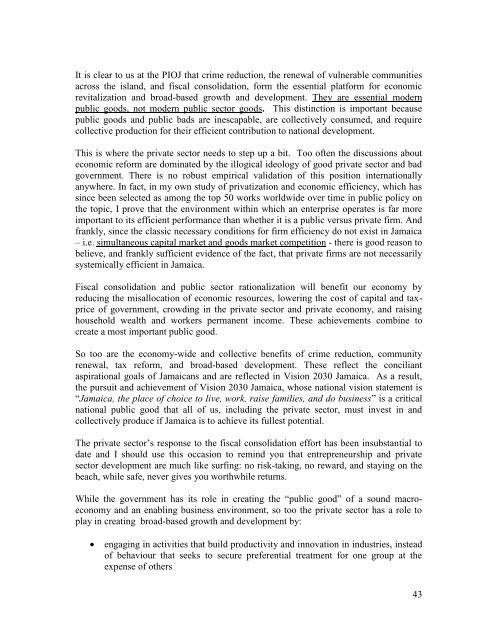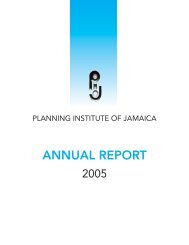PIOJ Growth-Inducement Strategy - Planning Institute of Jamaica
PIOJ Growth-Inducement Strategy - Planning Institute of Jamaica
PIOJ Growth-Inducement Strategy - Planning Institute of Jamaica
You also want an ePaper? Increase the reach of your titles
YUMPU automatically turns print PDFs into web optimized ePapers that Google loves.
It is clear to us at the <strong>PIOJ</strong> that crime reduction, the renewal <strong>of</strong> vulnerable communities<br />
across the island, and fiscal consolidation, form the essential platform for economic<br />
revitalization and broad-based growth and development. They are essential modern<br />
public goods, not modern public sector goods. This distinction is important because<br />
public goods and public bads are inescapable, are collectively consumed, and require<br />
collective production for their efficient contribution to national development.<br />
This is where the private sector needs to step up a bit. Too <strong>of</strong>ten the discussions about<br />
economic reform are dominated by the illogical ideology <strong>of</strong> good private sector and bad<br />
government. There is no robust empirical validation <strong>of</strong> this position internationally<br />
anywhere. In fact, in my own study <strong>of</strong> privatization and economic efficiency, which has<br />
since been selected as among the top 50 works worldwide over time in public policy on<br />
the topic, I prove that the environment within which an enterprise operates is far more<br />
important to its efficient performance than whether it is a public versus private firm. And<br />
frankly, since the classic necessary conditions for firm efficiency do not exist in <strong>Jamaica</strong><br />
– i.e. simultaneous capital market and goods market competition - there is good reason to<br />
believe, and frankly sufficient evidence <strong>of</strong> the fact, that private firms are not necessarily<br />
systemically efficient in <strong>Jamaica</strong>.<br />
Fiscal consolidation and public sector rationalization will benefit our economy by<br />
reducing the misallocation <strong>of</strong> economic resources, lowering the cost <strong>of</strong> capital and taxprice<br />
<strong>of</strong> government, crowding in the private sector and private economy, and raising<br />
household wealth and workers permanent income. These achievements combine to<br />
create a most important public good.<br />
So too are the economy-wide and collective benefits <strong>of</strong> crime reduction, community<br />
renewal, tax reform, and broad-based development. These reflect the conciliant<br />
aspirational goals <strong>of</strong> <strong>Jamaica</strong>ns and are reflected in Vision 2030 <strong>Jamaica</strong>. As a result,<br />
the pursuit and achievement <strong>of</strong> Vision 2030 <strong>Jamaica</strong>, whose national vision statement is<br />
“<strong>Jamaica</strong>, the place <strong>of</strong> choice to live, work, raise families, and do business” is a critical<br />
national public good that all <strong>of</strong> us, including the private sector, must invest in and<br />
collectively produce if <strong>Jamaica</strong> is to achieve its fullest potential.<br />
The private sector’s response to the fiscal consolidation effort has been insubstantial to<br />
date and I should use this occasion to remind you that entrepreneurship and private<br />
sector development are much like surfing: no risk-taking, no reward, and staying on the<br />
beach, while safe, never gives you worthwhile returns.<br />
While the government has its role in creating the “public good” <strong>of</strong> a sound macroeconomy<br />
and an enabling business environment, so too the private sector has a role to<br />
play in creating broad-based growth and development by:<br />
<br />
engaging in activities that build productivity and innovation in industries, instead<br />
<strong>of</strong> behaviour that seeks to secure preferential treatment for one group at the<br />
expense <strong>of</strong> others<br />
43
















